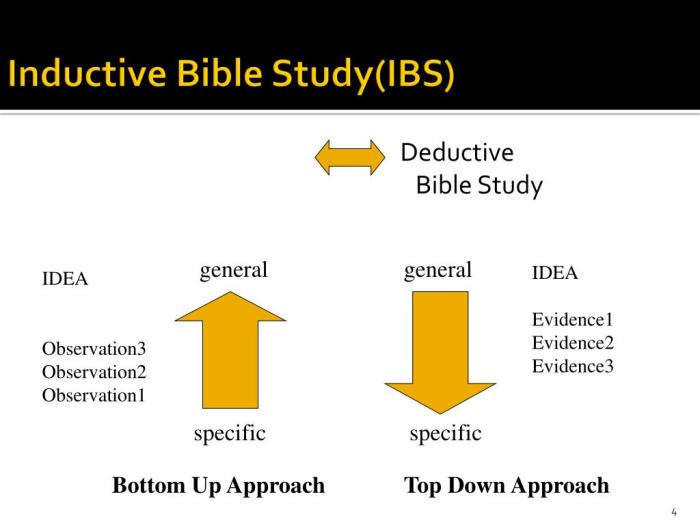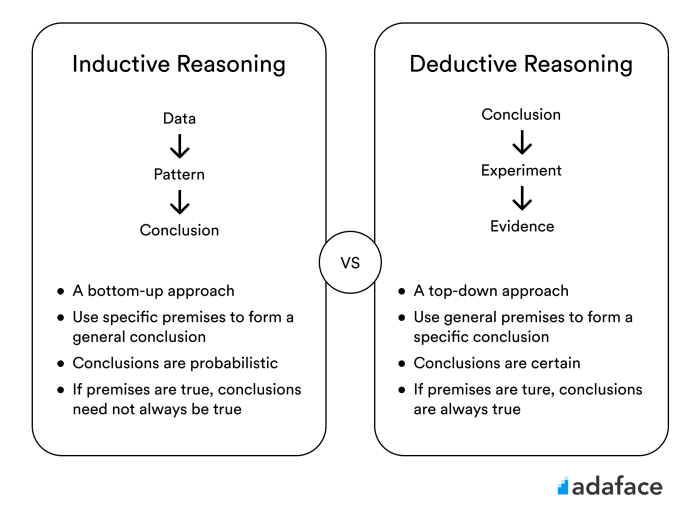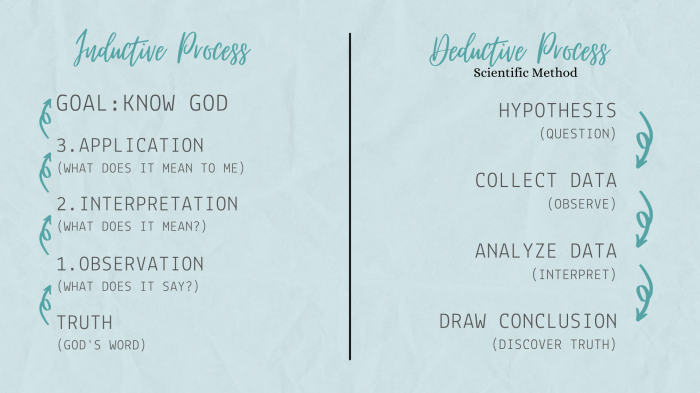Inductive bible study vs deductive – Inductive and deductive Bible study, two distinct approaches, offer unique paths to understanding Scripture. Inductive study invites us to observe, interpret, and apply the text directly, while deductive reasoning draws conclusions from general principles. This article delves into the key differences, strengths, and applications of these methods, empowering readers to navigate the depths of God’s Word with greater clarity and depth.
Through a comparative analysis, we will uncover the benefits and limitations of each approach, providing a comprehensive guide to effective Bible study. By understanding the nuances of inductive and deductive reasoning, we can unlock the transformative power of Scripture and deepen our relationship with God.
Overview of Inductive vs. Deductive Bible Study: Inductive Bible Study Vs Deductive
Inductive and deductive Bible study are two distinct approaches to interpreting Scripture. Inductive Bible study involves observing and interpreting Scripture to derive meaning, while deductive Bible study involves applying pre-existing principles or doctrines to Scripture to support a particular interpretation.
Inductive Bible study emphasizes the importance of careful observation and interpretation of the text itself, while deductive Bible study places more emphasis on the application of external principles and doctrines.
Both inductive and deductive Bible study have their strengths and weaknesses. Inductive Bible study can lead to a deeper understanding of the text itself, while deductive Bible study can help to ensure that interpretations are consistent with established doctrines.
Inductive Bible Study

Inductive Bible study involves observing and interpreting Scripture to derive meaning. It is a process of careful observation, interpretation, and application of Scripture.
The following steps are involved in inductive Bible study:
- Observation: This involves carefully reading and observing the text of Scripture, noting key words, phrases, and ideas.
- Interpretation: This involves interpreting the meaning of the text, taking into account the context, grammar, and historical background.
- Application: This involves applying the meaning of the text to one’s own life and situation.
Inductive Bible study can be a rewarding experience that leads to a deeper understanding of Scripture and its application to one’s own life.
Deductive Bible Study

Deductive Bible study involves applying pre-existing principles or doctrines to Scripture to support a particular interpretation. It is a process of reasoning from general principles to specific applications.
The following steps are involved in deductive Bible study:
- Start with a general principle or doctrine.
- Apply the principle or doctrine to a specific passage of Scripture.
- Draw a conclusion based on the application of the principle or doctrine.
Deductive Bible study can be a helpful way to ensure that interpretations are consistent with established doctrines. However, it is important to be careful not to force the text to fit a pre-existing interpretation.
Comparing Inductive and Deductive Bible Study

The following table compares the key features of inductive and deductive Bible study:
| Feature | Inductive Bible Study | Deductive Bible Study |
|---|---|---|
| Approach | Observes and interprets Scripture to derive meaning | Applies pre-existing principles or doctrines to Scripture |
| Methods | Observation, interpretation, application | Reasoning from general principles to specific applications |
| Outcomes | Deeper understanding of the text itself | Interpretations consistent with established doctrines |
| Strengths | Can lead to a deeper understanding of the text | Can help to ensure that interpretations are consistent with established doctrines |
| Weaknesses | Can be time-consuming | Can lead to interpretations that are forced to fit a pre-existing interpretation |
Common Queries
What is the key difference between inductive and deductive Bible study?
Inductive study begins with observation and interpretation of the text itself, while deductive study starts with general principles and draws conclusions.
Which approach is better for personal growth?
Inductive study is often preferred for personal growth as it encourages active engagement with the text and fosters a deeper understanding of its context and meaning.
Can both methods be used together?
Yes, combining inductive and deductive approaches can provide a balanced and comprehensive understanding of Scripture.